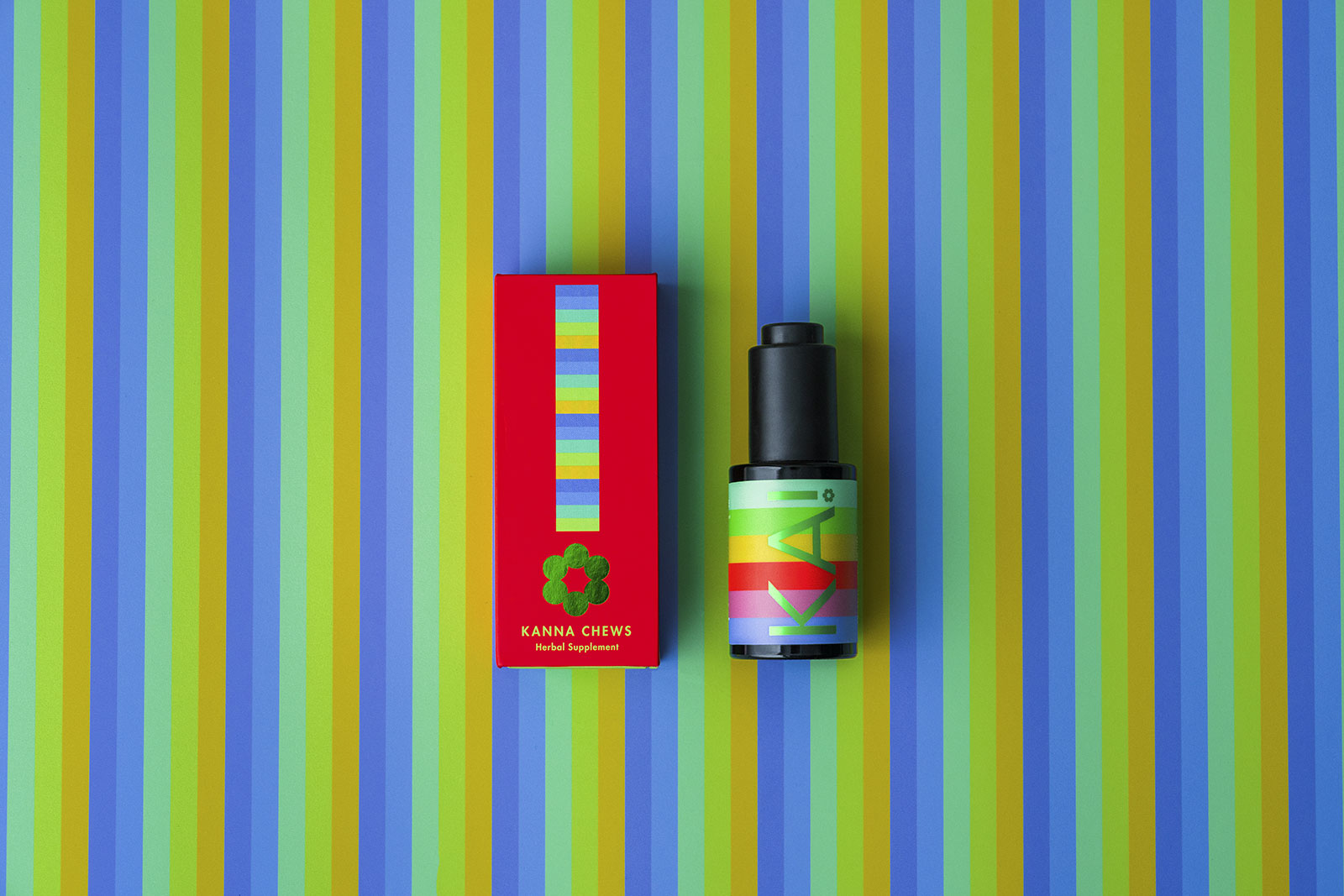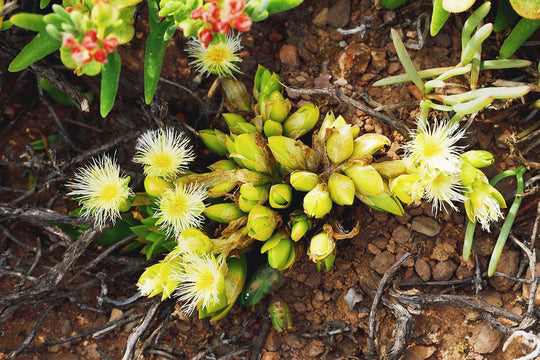Is Kanna safe to consume? All the science behind it
For centuries, indigenous cultures have collaborated with plant medicine to treat physical and emotional ailments. Sceletium tortuosum, commonly known as Kanna or kougoed, is one such medicinal plant that’s native to South Africa. This psychoactive (not psychedelic) flowering succulent has earned quite a reputation thanks to its plethora of therapeutic properties—everything from helping to enhance mood and reduce stress and anxiety1 to supporting cognition2 and increasing stamina3. But the big question remains: is it safe to consume?
The good news is that Kanna has been studied extensively over the last thirty years with more human studies underway, and the results are promising! Research indicates that this plant harbors a host of chemical compounds known to interact with the brain and body in ways that promote relaxation and joy.
What's more, while there is always a risk of adverse reactions when using any supplement or medicine, Kanna has been found to be well tolerated in clinical trials, with few side effects, making it a safe option for therapeutic use when taken as directed.
What does Kanna do to your body and your brain?
Kanna contains numerous active alkaloids, the most prominent of which are mesembrine and mesembrenone which interact with the brain in various ways. Because Kanna is both a serotonin reuptake inhibitor and a serotonin-releasing agent, one of the principal impacts of this plant is increased serotonin levels, which can positively affect mood and boost the mechanisms of attention and memory while improving cognitive function.
By stimulating GABA, opioid, cholecystokinin and melatonin neuroreceptors in the brain, Kanna can provide an array of beneficial effects. Specifically, GABA calms nerve activity to help reduce anxiety; natural opioids soothe pain and bring about a feeling of tranquility; cholecystokinin suppresses appetite and prevents gut inflammation; finally, melatonin enhances sleep quality for improved restfulness.
Kanna also increases energy use in the body by inhibiting an enzyme known as PDE4 (phosphodiesterase 4)4. This is why Kanna has the effect of being both soothing and providing grounded energy simultaneously. PDE4 inhibition also plays a large role in reducing inflammation and pain relief.
Because of its capacity to increase serotonin levels, studies suggest it may effectively treat depression, anxiety, and other mental health concerns5. Kanna may also contain neuroprotective and neuro-regenerative characteristics, which may help guard against cognitive loss caused by age or other conditions like Alzheimer's and Parkinson's6.
Active compounds in Kanna
All in all, Kanna is a well-studied plant with many impressive potential health benefits. Sceletium tortuosum contains a large profile of over 35 alkaloids such as mesembrine, mesembrenone, mesembrenol, tortuosamine and chennaine. These alkaloids biochemically interact with the brain and its serotonin and dopamine receptors in various ways to produce positive results and a fuller sense of aliveness, from calming anxiety and improving cognitive function to lifting mood and promoting better sleep quality. Mesembrine increases serotonin availability in the body in two elegant ways - first, by inhibiting the reuptake of serotonin; and second, by upregulating a protein called VMAT2 (vesicular monoamine transporter 2) that carries neurotransmitters out of cells, thereby activating serotonin. Mesembrenone on the other hand inhibits the enzyme PDE4 (phosphodiesterase 4) which influences pain receptors and also boosts energy use in the body.
With its impressive ability to simultaneously calm and provide energy, Kanna is a promising natural medicine that may be useful for treating depression, anxiety and other mental health conditions as well as for optimizing well-being.
Kanna safety
Kanna has a relatively strong safety profile compared to many other psychoactive and psychedelic substances but it would still be wise to exercise caution, especially in combination with other substances and medications. Kanna is a relatively safe psychoactive plant. However, to avoid any potential risks or negative effects, it is important to know its contraindications with other substances. It not advisable to take Kanna in conjunction monoamine oxidase inhibitors (MAOIs), selective serotonin reuptake Inhibitors (SSRIs), serotonin-norepinephrine reuptake inhibitors (SNRIs), Central Nervous System (CNS) depressants or other psychotropic drugs. Taking Kanna with SSRIs and MAOIs can lead to too much serotonin in the nervous system which can cause a condition called serotonin syndrome. Symptoms include increased heart rate, insomnia, confusion, agitation and high blood pressure. Midler forms of serotonin syndrome may go away after a day or two. However, in serious cases, serotonin syndrome could lead to high fever, tremors, seizures and unconsciousness and can be life-threatening.
If you are currently taking prescription medications or have any pre-existing medical conditions, please speak with your doctor or healthcare professional before using Kanna. Additionally, it is advisable to avoid excessive amounts of alcohol and to avoid mixing in psychedelic substances such as ketamine, MDMA, psilocybin and LSD, as well as sedatives and benzodiazepines.
Overall, Kanna is considered to be a safe herbal supplement with few known side effects. It has the potential to provide therapeutic benefits without the risks associated with traditional psychotropic drugs. Moreover, unlike many of the other substances mentioned here, Kanna is non-habit-forming and the body does not build tolerance for it- meaning, you will not have to take larger amounts over time to achieve the same benefit. Kanna is also an adaptogenics7 plant which means it is non-toxic, restores balance in the body and helps build resilience to stress.
Possible side effects
Though Kanna is generally considered to be safe, it can cause some side effects, such as headaches, loss of appetite nausea and gastrointestinal discomfort. As with any supplement or medication, your individual physiology and genetics may influence the severity of these symptoms. It’s helpful to note that these symptoms can sometimes be part of a priming effect as the body gets used to a new substance, and they may go away after a few days. Before taking Kanna, consult your healthcare provider to ensure it is suitable for you.
Tolerability and toxicity of Kanna
Kanna is well tolerated and has not been found to be toxic in any clinical trials. Studies on Kanna have not found any apparent toxicological effects when taken in humans over three months at a supplemental dose (8mg or 25mg once daily)8 or in rats given a 18000x higher than recommended dose.9
The safety and tolerability variables studied were vital signs, physical examination, 12-lead electrocardiogram, laboratory assessments (hematology, biochemistry, and urinalysis and the recording of adverse events.
The most common side effects reported are mild headaches, nausea and gastrointestinal discomfort. To reduce the chances of experiencing these symptoms, it is recommended that you begin with a low dosage and gradually increase it over time.
It is important to note that Kanna should not be combined with other psychotropic drugs, alcohol or psychedelics, as this could amplify its effects. As with any supplement, speak to your doctor before use if you have any underlying medical conditions or take any other medications to ensure there aren’t contraindications.
Given its history of safe use and lack of toxicity in clinical trials, Kanna appears to be a relatively safe natural alternative to chemical antidepressant, anxiolytic or psychotropic drugs. Its purported therapeutic benefits can make it a valuable supplement for mood and cognitive enhancement, particularly when used in conjunction with lifestyle changes such as exercise and a well balanced, nutrient-rich diet.

KA!librate your brain
Calibrate your brain with Kanna supplements and enjoy greater mental clarity, improved mood, a more regulated nervous system and greater sense of well-being. Formulated by KA! Empathogenics, our Chew and Tincture supplements unlock the full potential of this powerful South African botanical - so that you can feel more alive and better connect with yourself and others.
Give it a go and see just how effective Kanna really is!
CONTRAINDICATIONS: Do not use Kanna or KA! products in conjunction with Monoamine Oxidase Inhibitors (MAOIs), Selective Serotonin Reuptake Inhibitors (SSRIs), Serotonin-Norepinephrine Reuptake inhibitors (SNRIs), Norepinephrine and Dopamine Reuptake Inhibitors (NDRI's), Benzodiazepines or Central Nervous System (CNS) depressants without medical supervision by a qualified healthcare professional. If you are currently taking prescription medications or have any pre-existing medical conditions, please speak with your doctor or healthcare professional before using Kanna or KA! Never disregard professional medical advice or delay in seeking professional advice because of something you have read here or on the website.
Disclaimers: Any content in this article and the KA! Empathogenics website is for educational and product information purposes only and is not intended as a substitute for medical advice. Information and statements regarding herbal supplements in this article and on the website have not been evaluated by the Food and Drug Administration and are not intended to diagnose, treat, cure, or prevent any disease.
1Harvey, A. L., Young, L. C., Viljoen, A. M., & Gericke, N. P. (2011). Pharmacological actions of the South African medicinal and functional food plant sceletium tortuosum and its principal alkaloids. Journal of Ethnopharmacology, 137(3), 1124–1129. https://doi.org/10.1016/j.jep.2011.07.035; Olatunji, T. L., Siebert, F., Adetunji, A. E., Harvey, B. H., Gericke, J., Hamman, J. H., & Van der Kooy, F. (2022). Sceletium tortuosum: A review on its phytochemistry, pharmacokinetics, biological, pre-clinical and clinical activities. Journal of Ethnopharmacology, 287, 114711. https://doi.org/10.1016/j.jep.2021.114711
2Brendler, T., Brinckmann, J. A., Feiter, U., Gericke, N., Lang, L., Pozharitskaya, O. N., Shikov, A. N., Smith, M., & Wyk, B.-E. V. (2021). Sceletium for managing anxiety, depression and cognitive impairment: A traditional herbal medicine in modern-day regulatory systems. Current Neuropharmacology, 19(9), 1384–1400. https://doi.org/10.2174/1570159x19666210215124737
3Hoffman, J. R., Markus, I., Dubnov-Raz, G., & Gepner, Y. (2020). Ergogenic effects of 8 days of sceletium tortuosum supplementation on mood, visual tracking, and reaction in recreationally trained men and women. Journal of Strength and Conditioning Research, 34(9), 2476–2481. https://doi.org/10.1519/jsc.0000000000003693
4Terburg, D., Syal, S., Rosenberger, L. A., Heany, S., Phillips, N., Gericke, N., Stein, D. J., & van Honk, J. (2013). Acute effects of sceletium tortuosum (zembrin), a dual 5-HT reuptake and PDE4 inhibitor, in the human amygdala and its connection to the hypothalamus. Neuropsychopharmacology, 38(13), 2708–2716. https://doi.org/10.1038/npp.2013.183; Manganyi, M. C., Bezuidenhout, C. C., Regnier, T., & Ateba, C. N. (2021). A chewable cure “Kanna”: Biological and Pharmaceutical Properties of Sceletium tortuosum. Molecules, 26(9), 2557. https://doi.org/10.3390/molecules26092557; Carpenter, J. M., Jourdan, M. K., Fountain, E. M., Ali, Z., Abe, N., Khan, I. A., & Sufka, K. J. (2016). The effects of sceletium tortuosum (L.) N.E. br. extract fraction in the chick anxiety-depression model. Journal of Ethnopharmacology, 193, 329–332. https://doi.org/10.1016/j.jep.2016.08.019
5Manganyi, M. C., Bezuidenhout, C. C., Regnier, T., & Ateba, C. N. (2021). A chewable cure “Kanna”: Biological and Pharmaceutical Properties of Sceletium tortuosum. Molecules, 26(9), 2557. https://doi.org/10.3390/molecules26092557
6Luo, Y., Shan, L., Xu, L., Patnala, S., Kanfer, I., Li, J., Yu, P., & Jun, X. (2022). A network pharmacology-based approach to explore the therapeutic potential of sceletium tortuosum in the treatment of Neurodegenerative Disorders. PLOS ONE, 17(8). https://doi.org/10.1371/journal.pone.0273583
7Luo Yangwen, Wen Jing, Kanfer Isadore, Yu Pei, Patnala Srinivas. Sceletium Tortuosum: Effects on Central Nervous System and Related Disease. Journal of Pharmaceutical and Biomedical Sciences. 2020 Jun; 10(6): 151-160
8Nell, H., Siebert, M., Chellan, P., & Gericke, N. (2013). A randomized, double-blind, parallel-group, placebo-controlled trial of extract sceletium tortuosum (zembrin) in healthy adults. The Journal of Alternative and Complementary Medicine, 19(11), 898–904. https://doi.org/10.1089/acm.2012.0185
9Murbach, T. S., Hirka, G., Szakonyiné, I. P., Gericke, N., & Endres, J. R. (2014). A toxicological safety assessment of a standardized extract of sceletium tortuosum (Zembrin®) in rats. Food and Chemical Toxicology, 74, 190–199. https://doi.org/10.1016/j.fct.2014.09.017

